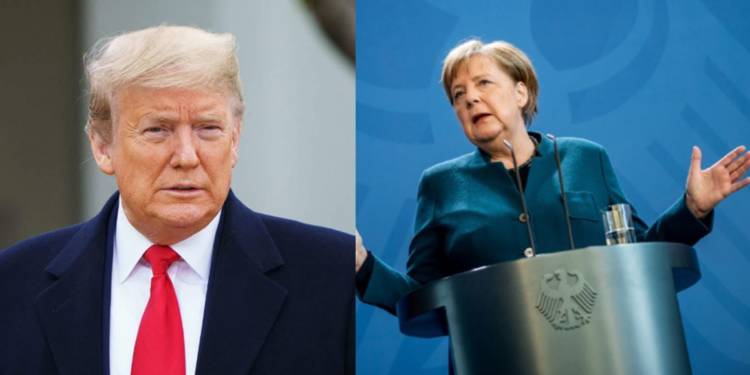While the entire democratic world has rallied behind the United States in a bid to confront a belligerent China, Germany led by Chancellor Angela Merkel has taken a remarkably different approach. Berlin has thus far refused to act on China, and Merkel has no qualms against outright rejecting Trump’s global leadership in the ongoing confrontation with China.
Germany has higher ambitions; to reclaim its glory of the pre-World War- I era that was eroded by the Treaty of Versailles. Till now, Germany was claiming that the level of democracy in a country cannot guide Berlin’s policy. However, now, perhaps under pressure from other European nations, Germany has suspended its extradition treaty with Hong Kong.
Germany’s Foreign Minister Heiko Maas said, “The Hong Kong government’s decision to to postpone the elections and disqualify a dozen opposition candidates for the election… is a further encroachment on the rights of Hong Kong citizens.” Mass added, “Given the current developments, we have decided to suspend the extradition treaty with Hong Kong.”
Meanwhile, China has hit back at Germany over the suspension of the extradition treaty, and has called it a “serious breach of international law.” The Chinese Embassy has issued a statement expressing “strong indignation and firm opposition to the wrong remarks of German Foreign Minister Heiko Maas.”
This move to suspend the extradition treaty with Hong Kong is the part of a very strong signaling in the part of Germany. Notably, Australia, Canada, New Zealand, the United Kingdom and the United States have also suspended their extradition treaties, but Germany has acted differently.
Firstly, Germany has acted much later than US allies like New Zealand, Australia, Canada and the UK. Secondly, it has chosen a completely different reason from other countries who suspended their extradition treaties with Hong Kong over the brutal imposition of the draconian National Security Law in Hong Kong.
Therefore, Germany wants to show that while US allies suspended the extradition treaty because of American leadership, Berlin had its own reasons for the latest move regarding Hong Kong. In the same balancing move, Germany is also trying to show that Berlin is not pro-China either.
Within Germany, it is well recognised that Otto von Bismarck and his successors had made the German empire a Great Power in the 19th and early 20th centuries. However, this was short-lived as Germany’s ambitions to dominate Europe during the First World War backfired badly. Till 1990, Germany remained divided. Now, Germany wants to become a Great Power all over again.
Merkel has therefore been adamant about not playing second fiddle to United States President Donald Trump. Between Germany and the United States, the tussle is not so much about China as it is about Berlin’s Great power ambitions. Apart from not playing second fiddle to Trump, Merkel has several reasons behind not joining the global backlash against China.
One, Germany has very close trade ties with China. China is Germany’s biggest trade partner with the trade volume hitting a new high of 233 billion US dollars in 2019. Merkel has always been careful not to offend China, as this is a part of her strategy to undermine the Washington-led rules-based world order.
Two, Germany fears that a global backlash against China would mean Europe, or the Atlantic fading into irrelevance. And it might be already happening with Trump pulling NATO troops out of Germany, and at the same time increasing deployment in the Indo-Pacific.
It is for this reason that Merkel doesn’t want China to face a major backlash. Germany is therefore constantly trying to weave the narrative that Russia is the bigger villain. Therefore, the German Chancellor keeps pushing for European Union (EU) sanctions on Russia over the 2014 Crimea annexation. Wrongly creating the impression of a major threat in Russia keeps the EU geo-strategically relevant.
Germany feels that finally, it can control the EU as its de facto head, and therefore it dreads the thought of world focus shifting from the Atlantic to the Indo-Pacific. Merkel wants to balance the narrative according to her own needs, even if this act of balancing goes against the US foreign policy calculus.
Germany’s ambitions to become a Great Power are not very surprising. The fact remains that it is the biggest economy within the EU today. Yet France is a Permanent Member of the UN Security Council (UNSC), while Germany could only become a ‘P5+1’ country. Berlin might believe that the international arrangements have become somewhat anachronistic and do not reflect the present-day equations. This is what dictates Germany’s remarkably detached approach from the US-led free world countries.

























